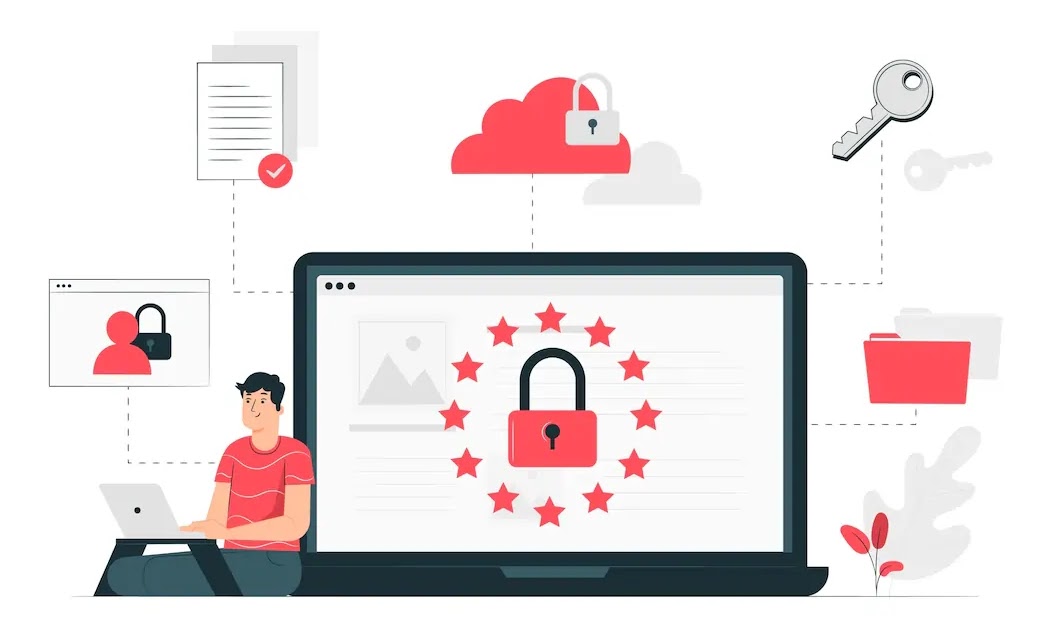Is cyber security a good career path? With the increasing threat of cyber attacks and the growing reliance on technology, the demand for cybersecurity professionals has never been higher.
Is Cyber Security A Good Career Path?
A careerin cybersecurity offers job security, competitive salaries, and numerous opportunities for learning and development. Whether you are a recent graduate or an experienced professional, cybersecurity can be a challenging and rewarding field.
So, if you are looking for a career path that combines your interest in technology with your desire to make a difference, cybersecurity may be the right choice for you.
What Does A Cyber Security Career Do?
Cybersecurity is the practice of protecting computer systems, networks, and sensitive information from theft, damage, or unauthorized access. A career in cybersecurity involves protecting companies and individuals from cyber attacks and data breaches.
Cybersecurity professionals are responsible for analyzing and detecting cyber threats, designing and implementing security measures, and responding to cyber incidents.
The scope of cybersecurity has expanded with the rapid growth of the digital world. Cybersecurity professionals work in various industries such as government agencies, financial institutions, healthcare, and technology companies.
They are responsible for ensuring the confidentiality, integrity, and availability of sensitive information and networks.
Cybersecurity professionals play a crucial role in maintaining the security and privacy of businesses and individuals. They work with cutting-edge technology, analyze and identify cyber threats, and develop and implement security measures to protect against them.
How To Become A Cybersecurity Analyst?
Becoming a cybersecurity analyst requires a combination of education, skills, and experience. Here are some steps to become a cybersecurity analyst:
- Earn a degree- A degree in cybersecurity, computer science, or a related field is required to become a cybersecurity analyst. A bachelor's or master's degree in cybersecurity provides a comprehensive understanding of security concepts, policies, and procedures.
- Gain experience - Gain experience through internships or entry-level positions in cybersecurity. This will provide exposure to different security technologies and tools, and help develop skills such as network security, data protection, and risk assessment.
- Develop skills - Develop skills in areas such as threat analysis, vulnerability assessment, and incident response. Also, stay updated with the latest security threats, vulnerabilities, and technologies.
- Obtain certifications- Certifications such as CompTIA Security+, Certified Information Systems Security Professional (CISSP), and Certified Ethical Hacker (CEH) are valuable in demonstrating knowledge and skills in cybersecurity.
- Network - Network with cybersecurity professionals through conferences, meetups, and online communities. This will help to stay updated with the latest trends and technologies in cybersecurity.
What Are The Benefits Of A Career In Cybersecurity?
A career in cybersecurity offers numerous benefits, including:
- High demand- The demand for cybersecurity professionals is continuously increasing as cyber threats become more sophisticated and frequent.
- Job security- Cybersecurity professionals are in high demand, and the job market is projected to grow rapidly in the coming years. This provides job security and stability.
- Career growth- Cybersecurity professionals can advance their careers by gaining experience, developing skills, and obtaining certifications.
- Competitive salaries- Cybersecurity jobs offer competitive salaries and benefits. The average salary for a cybersecurity analyst is $81,000 per year, according to Glassdoor.
- Challenging work- Cybersecurity is a dynamic and challenging field that requires problem-solving and critical thinking skills.

Getting Into Cyber Security: 5 Skills You NEED to Learn
What Are The Education And Skills Needed To Become A Cybersecurity?
To become a cybersecurity professional, a degree in cybersecurity, computer science, or a related field is required. In addition, the following skills are necessary:
- Knowledge of cybersecurity concepts, policies, and procedures.
- Knowledge of network security, including firewalls, VPNs, and intrusion detection systems.
- Understanding of security protocols and technologies, such as encryption and access control.
- Knowledge of threat analysis and vulnerability assessment.
- Experience in incident response and disaster recovery.
- Proficiency in programming languages such as Python, Java, or C++.
- Ability to communicate effectively with technical and non-technical stakeholders.
- Critical thinking and problem-solving skills.
Types Cybersecurity Jobs
Cybersecurity is a vast field with various types of jobs available. Some of the common types of cybersecurity jobs are:
Security Analyst
Security analysts are responsible for analyzing and detecting potential cyber threats and vulnerabilities, developing and implementing security measures, and responding to cyber incidents.
Penetration Tester
Penetration testers are ethical hackers who identify vulnerabilities in computer systems and networks by conducting simulated cyber attacks. They provide recommendations for improving security and preventing cyber attacks.
Security Engineer
Security engineers design and implement security systems and solutions to protect against cyber threats. They work with network security, cloud security, and application security.
Cryptographer
Cryptographers develop and implement cryptographic algorithms and protocols to secure data and communication. They work with encryption, decryption, and digital signatures.
Cybersecurity Consultant
Cybersecurity consultants provide advice and recommendations to organizations on improving their security posture. They assess risks, develop security strategies, and provide training to employees.
Incident Responder
Incident responders are responsible for responding to cyber incidents and mitigating their impact. They investigate the incident, identify the root cause, and implement measures to prevent future incidents.
Is Cybersecurity High Paying And Salary?
Cybersecurity jobs offer competitive salaries and benefits. The average salary for a cybersecurity analyst is $81,000 per year, according to Glassdoor. The salary varies depending on the level of experience, education, and location.
Cybersecurity professionals can also earn higher salaries by obtaining advanced certifications and gaining experience in specialized areas such as cloud security, application security, and data privacy.

Reality of working in Cyber Security | Pros and Cons
Is Cybersecurity Stressful?
Cybersecurity can be a stressful job due to the nature of the work. Cybersecurity professionals are responsible for protecting sensitive information and networks from cyber threats and attacks. They work in a fast-paced environment and are required to respond to incidents quickly and effectively.
Cybersecurity professionals also need to stay updated with the latest security threats and technologies, which requires continuous learning and training. The pressure to ensure the security and privacy of businesses and individuals can cause stress.
However, stress can be managed through effective time management, prioritization, and communication. Cybersecurity professionals can also take breaks and practice self-care to reduce stress.
Is Cybersecurity Hard To Get A Job?
Cybersecurity is a growing field with high demand for skilled professionals. However, getting a job in cybersecurity requires a combination of education, skills, and experience.
Entry-level positions in cybersecurity are available, but they require a degree in cybersecurity, computer science, or a related field. Gaining experience through internships or entry-level positions is also essential.
Obtaining certifications such as CompTIA Security+, Certified Information Systems Security Professional (CISSP), and Certified Ethical Hacker (CEH) is valuable in demonstrating knowledge and skills in cybersecurity.
Networking with cybersecurity professionals and participating in cybersecurity communities can also help in finding job opportunities.
How Many Hours Do Cybersecurity Work?
The working hours of cybersecurity professionals vary depending on the industry and the company. Cybersecurity professionals in government agencies and financial institutions may work regular office hours, while those in technology companies may work longer hours due to the fast-paced nature of the industry.
Cybersecurity professionals may also be required to work outside of regular hours in case of cyber incidents or emergencies. This requires being available and responsive to incidents at all times.
People Also Ask
How Can Individuals Protect Themselves From Cyber Threats?
Individuals can protect themselves from cyber threats by taking various measures such as creating strong passwords, using multi-factor authentication, keeping software up to date, being cautious of suspicious emails and messages, and avoiding public Wi-Fi networks. Additionally, individuals can use antivirus software and backup important data to prevent data loss.
What Are The Ethical Considerations In Cybersecurity?
Ethical considerations in cybersecurity include issues such as privacy, data protection, and information sharing. Cybersecurity professionals have a responsibility to protect the privacy and security of their clients or organizations while also adhering to ethical standards and legal regulations. They must also consider the ethical implications of their actions when dealing with cyber attacks and the potential consequences of their decisions.
What Are Some Common Cyber Threats That Businesses Face?
Some common cyber threats that businesses face include phishing attacks, malware, ransomware, denial of service (DoS) attacks, and advanced persistent threats (APTs). These threats can cause financial loss, data breaches, and reputational damage for businesses. It's important for businesses to have strong cybersecurity measures in place to prevent and mitigate these threats.
What Is The Role Of Artificial Intelligence In Cybersecurity?
Artificial intelligence (AI) is increasingly being used in cybersecurity to detect and respond to cyber threats. AI can help analyze large amounts of data to identify potential threats and anomalies, which can be challenging for human analysts to do. Additionally, AI can be used to automate certain cybersecurity tasks, which can improve efficiency and response times.
What Is The Future Of Cybersecurity?
The future of cybersecurity is likely to involve more advanced technologies, such as AI and machine learning, to detect and respond to cyber threats. Additionally, as more devices become connected to the internet and more data is generated, cybersecurity will become even more critical to protect against data breaches and other cyber attacks. It's important for cybersecurity professionals to stay updated with the latest trends and technologies to stay ahead of cyber threats.
Conclusion
So, is cyber security a good career path? The answer is a big yes! A career in cybersecurity offers a challenging and rewarding job with high demand, job security, and competitive salaries. Although cybersecurity can be a stressful job due to the nature of the work, stress can be managed through effective time management and self-care.
